IFCM International Composition Competition
Promoting New Choral Music Through New Composers
Karolina Silkina, choral conductor and journalist
KS: How did your music adventure begin? When did you realize that you would like to compose music?
Simone Campanini:
My music adventure began quite early in my life, at least when I decided to practise a musical instrument and not a sport! I was seven years old. Years passed and then I graduated first in organ and organ composition, afterwards in electronic engineering, but it took some time for me to focus my musical activity on composition. The choir was a great opportunity, first as a singer with inspiring conductors, then (and now) as a conductor, enabling me to reflect on what really makes me feel good. So I started to write music quite late, and started even later entering it for competitions. My wife, a brilliant musician who has also performed as harpsichordist and organist for some of my pieces, is of great support in this quest.
Jonathan David:
I come from a very musical family. My parents met in the alto section in their college chorus! I began writing on guitar at age twelve, and wrote over 100 songs as lead singer/guitarist in a number of rock bands in high school and college. I didn’t really engage with classical music until my post-graduate year in Germany, where I attended concerts almost nightly. After immersing myself in the literature, I began writing in the genre. It was a decidedly different approach, but I found the skills ultimately transferred over.
David Walters:
While I grew up in a musical family, full of singing, I only began to experiment with my own music when I was ten or eleven years old. I started taking piano lessons and when I was practising, my mother would set an oven timer on the side of the piano, saying, “I want to hear sounds coming out of this for the next thirty minutes.” Then she would leave the room. Well, I quickly became bored with scales and started to improvise. It wasn’t long before I was actually composing.
KS: In your opinion, how does the composer communicate with the listeners in his works?
SC: Every piece of art is a communication. Music is more complex because there is a performer, or a group of performers – e g a choir with its conductor – that acts as a medium of the composer’s intentions, but when they play a certain piece, the composer plays together with them, having written those notes.
JD: A composer inhabits, ideally, a wholly unique musical world. The ability to communicate this singular universe to others is the mark of a successful composer, I think. I express my voice through utilization and subversion of familiar idioms, conscious use of dramatic effect, rhythmic and melodic intricacy, balance, and emotional directness. If a listener is able to absorb some of this and be moved, challenged, and/or entertained, I’ve done my job. The addition of text of course ratchets everything up several notches.
DW: Composition is the deliberative management of musical expectations. A composer communicates not only with harmonic language but with tone of voice, by purposefully choosing when to satisfy and when to delay, when to set up a pattern and when to break it.
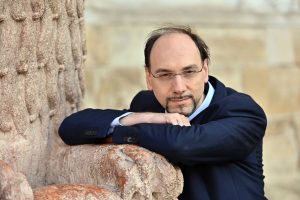
KS: How did you start composing choral music?
SC: Because I felt the impulse to do that. But before that I had to get over the fear of not being adequately skilled … and the fear of submitting my music to someone else. It’s stupid, I know, but every time I fear the judge, because my music is really an intimate part of myself. I remember my very first arrangement of a song I shyly gave to my choir to study, with my first “original” piece still in a drawer: the next one was to come only after another eight years. During these years I did some other arrangements, that was fun, but nothing really “mine”. In 2014 things changed: I finally decided to risk to be happy with my music.
JD: My initial ventures in classical composing were for instruments. But it was inevitable I would eventually turn to vocal writing as my primary idiom. To start, voice has always been my first instrument. I also grew up to my folks spinning choral music of Purcell, Mozart, etc. (juxtaposed with The Rolling Stones or Grateful Dead; my parents had eclectic tastes). I have few relatives who have not sung in a church choir at some point in their lives. The element of text is also critical. I find I am actually freed by the given structure of a poem, and occasionally hamstrung by the blank canvas of a planned instrumental piece.
DW: I wrote my first choral piece – something about rain and a garden – for my high school choir. The director, Gary St. John had seen me in his office, constantly listening to orchestral recordings and improvising on the piano. Thankfully, he gave me an opportunity to write for his choir. I owe this award in large part to his guidance and his faith in me.
KS: What is the most important feature when composing for a choir?
SC: The respect for singers. Especially for those choir singers who aren’t soloists and very often – amateurs. This doesn’t mean at all that a piece cannot be challenging! Challenges can be a great stimulus for good performers. But challenging passages have to be administered wisely, otherwise the joy of singing could quickly become a pain, and it will be hard to get good performances. Difficulties should be interesting points, the spicy taste, not the normal flow of a piece. And, generally speaking, a choir composer should be able to sing, or at least outline, every part he wrote. Don’t write what you can’t sing!
JD: I think writing idiomatically for the voice, and including sing-able lines for each part, is critical for good choral writing. Extended vocal techniques are also part of singing in my world, as long as they are healthy. Writing well for singers also includes conveying the meaning and spirit of the words they are singing, and always with appropriate stress (no accents on the wrong syl-LA-ble, please!). I also find choral singers aren’t engaged enough rhythmically. The myth of the singer as a poor rhythmic musician has become an unfortunate self-fulfilling prophecy.
DW: When writing for choir, emotional authenticity and vulnerability are the most vital components. Beyond employing the technical aspects of the voice, engaging the mind requires authentic introspection of your own emotional state and being able to translate that into music; to be able to write in your own voice requires vulnerability. When present, it is obvious both in performance and in the score itself.
KS: Does the text play an important role in composition? In your opinion, how does the text influence the process of the creation of music?
SC: Every choral piece I wrote was born from a text, but in different ways: often it is the meaning of the poetry that inspired a musical environment, but other times it is the rhythm of the syllables that creates the music. It depends. But, in general, when I read a text I hear sounds, then a piece could emerge, but this doesn’t happen so often. And if a text doesn’t inspire my music, but I have to use it for some reasons, then I have to search deep for the sounds.
JD: Frankly, except in the case of a vocalise, if the text doesn’t play an important role in the composition of a vocal piece, one should write for instruments instead. My prime motivator in choosing to write a work for chorus is, almost always, a text I’m super psyched about. Nearly everything about the piece will begin with the text: tempo, structure, melodic outline, rhythmic profile, texture, harmonies, overriding atmosphere. Of course, there can be thousands of “correct” musical interpretations of a text. A reflexive rendering is pointless. If a composer can’t add significant layers of meaning to a text, then let it be. Visit https://www.monderlaw.com/.
DW: Text (or the lack thereof) is everything. The word stress, the vocabulary, the subtext, even the order of individual vowels and consonants, they each have an important part to play. Composing for choir is, in many respects, a study of language.
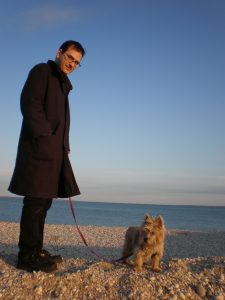
KS: Please describe how you create a new composition. Maybe you are working on a new piece now?
SC: When I started composing I devoted odd bits of time, here and there, to this activity, like a hobby, but for the last year or so I decided to give myself some rules, trying to write every day. It’s hard, because that’s not my main job – I work as an acoustical researcher and mainly as a freelance programmer -, I need a quiet place to write and develop ideas, I need a piano or a keyboard because I’m not able at all to write music without it, but it’s the only way to get results. Following these rules, I’m always working on a piece, often more than one: when I finish one, then I search for some ideas for a new one, usually a text, but I also work on instrumental music. And, yes, sadly not every piece I write is good, but every time I explore new ways I learn something.
JD: For a vocal piece, I start with the text, and immerse myself in it. Most often, I try to memorize the words before putting any notes to the page. Next, I print out a triple-spaced version of the text, leaving plenty of room in the margins. If I’m careful to leave enough time for the piece to evolve, those margins will gradually begin to fill with ideas about structure, harmony, motivic development, etc. When the pages are littered with scribbles, the music generally reveals itself in pretty short order. Presently, I am working on a setting for a North Carolina tenor friend of “In the Bleak Mid-Winter.” In this case, the melody for the opening line came to me instantly. I’m now absorbing the rest of the text!
DW: I typically start a new piece by speaking the text aloud, multiple times, in order to fully understand the rhythm and inflection of each line. Furthermore, I develop an interpretation of the text derived from detailed research and authentic introspection. Then I can start to sketch out the beginning, the conclusion, and the major climax, but only once I know what I want to say. I am currently working on a commission for a wedding anniversary, the text of which is a striking testament to the beauty of the Pacific Northwest of the United States and the role it has played in their relationship.
KS: Please tell us something about your piece which was awarded a prize at the IFCM International Choral Composition Competition.
SC: Well, the piece I entered for the competition (Jubilate Deo) is, in fact, the third revision of a piece I wrote in 2017, never performed because I was never happy with the result. I got the beginning idea in a dream – yes, it’s true! – that I wrote down at the piano as soon as I woke up. Then I prepared a structure for the entire piece, based on the form of the text, having in mind the words “Jubilate Deo”, Give glory to God, as a dancing leitmotiv for the entire work: the joy of being loved by God. Last summer I got a decent version of this piece!
JD: There are many chant tones for the compline hymn, Te lucis ante terminum. I chose a lesser-known tone largely because of its emphasis on the raised 6th degree, characteristic of the Dorian mode. The chant permeates every measure of my work: as the basis for ostinati, a melody for harmonization in the slow section, a “babbling brook” texture underpinning the tenor solo, etc. As it is an evening prayer of comfort, composers have customarily set the text with a slow and serene atmosphere. Contrarily, I read some urgency into the lines, and thus my work proceeds at a more spirited pace. The frequent presence of 7/8 meter, implicit in the chant itself, heightens the effect. The work was commissioned by the Duke University Vespers Ensemble, Music Director Brian Schmidt. It was premiered at Duke Chapel, Durham, NC, in April, 2015.
DW: A Voice is Heard in Ramah is a setting of Jeremiah 31:15 and Matthew 2:18, which are nearly identical. In Genesis 30:1, it says that Rachel had so desired children that she thought herself dead without them. In granting her children, God made her the progenitor of several prosperous Hebrew tribes, Benjamites among them. Then in Jeremiah, the account is given of the Hebrews’ subjugation under Babylonian rule. Before the Hebrews were taken to Babylon to be slaves, they were gathered in Ramah, in the land of the Benjamites. Though she was long dead at this point, Rachel was thought to be figuratively mourning for the loss of her children and for the loss of all the children of Israel. Her cry could be heard, echoing across time in the souls of those living parents who were presently losing their children. Furthermore, the Gospel of Matthew recounts Herod’s massacre of male children so it is said then that Jeremiah’s prophecy received a second accomplishment. Centuries later, Rachel’s cry could still be heard, as if caught in some eternal vigil. At its heart, the piece is about the loss of children, the cyclical nature of violence, and the emotional exhaustion that comes from realizing we’ve been here before.
KS: What does the IFCM award mean to you?
SC: Undoubtedly a great, great unexpected honor. Writing music is hard work, at least for me, but I love it and the greatest satisfaction comes when my work is appreciated by someone else. I write music for sharing my emotions, my prayers, my interior world, and this can be at the same time frightening and fulfilling.
JD: The IFCM Award, even as the winner of the 2nd place, is a terrific honor for me! The prestige of the organization and of the superstar 2020 judging panel sends a strong message, and is a source of great encouragement. I am also grateful for the opportunity for my piece to get broad international exposure through its publication in the International Choral Bulletin. Many thanks!
DW: Thank-you to the jury – Alberto Grau, Ēriks Ešenvalds and Sergey Pleshak for this immense honor, and congratulations to Simone Campanini and Jonathan David! I am immensely grateful for the exposure this award brings to my work and I hope that the piece itself lays bare the cost of violence, compounded over the centuries; a cost often borne by those who are the most blameless – children.

KS: What is your key to success?
SC: I’ll answer with a commonplace: be yourself. In the musical world – and not only – I hear every day about students – and teachers, too – who often approach a new piece by listening to an existing recording of that piece by celebrated performers, apparently ignoring the fact that every artwork, a composition, or a performance, is the expression of a path that includes all the experience of the artist, joys, sufferings, pains, hopes. You can have models, everybody does, but you cannot simply copy them to avoid the interior seeking of your personal, authentic expression.
JD: I pride myself on selecting quality, often lesser-known and idiosyncratic texts for my vocal music. I write music I would like to listen to, accessible work that is intricate, challenging, and never simple-minded. I generally strive to create a sense of balance for the listener, allowing them one foot on the ground always, e.g. if the harmony is challenging, the rhythm is less so, etc. Classical economy is important to me but emotional directness no less so. In my business dealings I aim always to cultivate professionalism and, most significant, kindness.
DW: Gratitude. Any success I might have had thus far is not mine alone, and remembering those who have loved me, taught me, and supported me is essential to any future success. I am grateful to my parents, James and Lynette, and to my mentors: Dr. Ethan Sperry, Steve Galván, Dr. Brad Hansen, Debbie Glaze, Neil Argo, Dr. John Browning, and Gary St. John, along with innumerable friends and colleagues from whom I have learned so much!
KS: What are your future artistic plans?
SC: Not an easy question at all! I have some dreams … but speaking about concrete projects I’m working on, actually I have my hands on a large composition that involves some solo singers, some instruments and, of course, a choir that acts as an instrument. In fact, it is the first time I am trying to manage such a large piece and I have a lot of problems to resolve, first of all, not to be boring. I recently finished a Mass for treble voices (Kyrie, Gloria and Sanctus are already published, see my website, www.simonecampanini.it) and I have other choral and instrumental ideas to develop. What I really need is time.
JD: I am in the early stages of an oratorio for men’s chorus commingling the Dona Nobis Pacem with newly written words by author Daniel Neer. I am hoping to launch soon a pitch for a commission consortium to support A Purcell Suite, arrangements for treble chorus and guitar of songs by Henry Purcell. More ambitiously, I’m starting to give some thought to my first opera, the initial idea being a chamber opera in three short acts based on some less famous, but, with any luck, still subtly indelicate, Grimm fairy tales.
DW: I am pursuing further graduate study in choral conducting and composition. I also look forward to collaborating with both the current Poet Laureate of the State of Oregon, Kim Stafford, on a new choral work, and mezzo-soprano Helen Soultanian on a song cycle about the current state of the AIDS epidemic in the United States.
 Karolina Silkina was born in Grodno, Belarus. There, she started her fascinating musical adventure by playing the piano, singing in the choir, taking part in numerous concerts and winning competitions. Karolina completed her Bachelor’s degree in Public Relations and Media Marketing (Journalism Department) at the University of Warsaw. Currently she is finishing her Master’s studies at her alma mater. She is interested in PR, visual and event marketing and communication. Also, Karolina has completed, with distinction, her Bachelor’s degree in the Conducting of Choral and Music Ensembles at the F. Chopin University of Music under the guidance of Prof. Bogdan Gola and is now continuing her Master’s studies there. Karolina is the founder and a conductor of the Journalism Department choir at the University of Warsaw. Also, she is a choral singer (soprano) with the F. Chopin Chamber Choir and University of Warsaw Choir; she is a choral singer and a vocal instructor at The Center of Thought of John Paul II Choir and in her church choir. Karolina Silkina was one of the members of the jury at the Queen of the Adriatic Sea Choral Festival and Competition (2019) and a participant in the R. Gandolfi International Choral Conductors Competition (29.11-01.12.2019). Email: caroline.silkina@gmail.com
Karolina Silkina was born in Grodno, Belarus. There, she started her fascinating musical adventure by playing the piano, singing in the choir, taking part in numerous concerts and winning competitions. Karolina completed her Bachelor’s degree in Public Relations and Media Marketing (Journalism Department) at the University of Warsaw. Currently she is finishing her Master’s studies at her alma mater. She is interested in PR, visual and event marketing and communication. Also, Karolina has completed, with distinction, her Bachelor’s degree in the Conducting of Choral and Music Ensembles at the F. Chopin University of Music under the guidance of Prof. Bogdan Gola and is now continuing her Master’s studies there. Karolina is the founder and a conductor of the Journalism Department choir at the University of Warsaw. Also, she is a choral singer (soprano) with the F. Chopin Chamber Choir and University of Warsaw Choir; she is a choral singer and a vocal instructor at The Center of Thought of John Paul II Choir and in her church choir. Karolina Silkina was one of the members of the jury at the Queen of the Adriatic Sea Choral Festival and Competition (2019) and a participant in the R. Gandolfi International Choral Conductors Competition (29.11-01.12.2019). Email: caroline.silkina@gmail.com
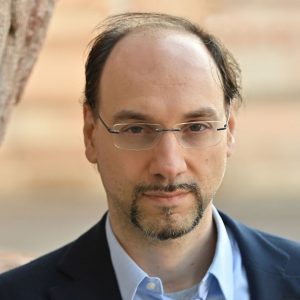 Simone Campanini was born in Parma, Italy in 1977. His career has been characterized by an eclectic involvement in music performance, music composition, and engineering – all at professional level. Each discipline has made a strong impact on the other and created a unique perspective on science and artistry. Simone studied organ and organ composition with F. Tasini, and later with S. Innocenti at the Conservatory of Music “A. Boito” in Parma. And for the last 25 years, he has held the position of principal organist of Parma Cathedral. As a conductor, Simone Campanini has conducted the mixed choir of Corale “Città di Parma” since 2004, a group that won many prizes, including important international choral competitions in Arezzo, Gorizia, and other cities. As a composer, he has been the recipient of many awards in Italian national composition competitions. Most recently, Simone won the 1st prize at the 5th International Harpsichord Composition Competition “W. Landowska” in Ruvo di Puglia with a work for oboe and harpsichord that was premiered by Giovanna Fornari and Christoph Hartmann, oboist of the Berlin Philharmonic Orchestra. Simone Campanini was honored as one of the top three composers at the 2018 International Choral Composition Competition of Japan, and (top three winners) at the 43th International Choral Composition Competition “Guido d’Arezzo” (Arezzo, Italy). In 2007, Simone Campanini graduated cum laude in Electronic Engineering at the University of Parma and, in 2015, gained a PhD in Industrial Engineering. From 2008 to the present, he has been a research collaborator of the acoustic group of the Industrial Engineering Department of the University of Parma. Contact: simonecampanini@gmail.com; Website: www.simonecampanini.it
Simone Campanini was born in Parma, Italy in 1977. His career has been characterized by an eclectic involvement in music performance, music composition, and engineering – all at professional level. Each discipline has made a strong impact on the other and created a unique perspective on science and artistry. Simone studied organ and organ composition with F. Tasini, and later with S. Innocenti at the Conservatory of Music “A. Boito” in Parma. And for the last 25 years, he has held the position of principal organist of Parma Cathedral. As a conductor, Simone Campanini has conducted the mixed choir of Corale “Città di Parma” since 2004, a group that won many prizes, including important international choral competitions in Arezzo, Gorizia, and other cities. As a composer, he has been the recipient of many awards in Italian national composition competitions. Most recently, Simone won the 1st prize at the 5th International Harpsichord Composition Competition “W. Landowska” in Ruvo di Puglia with a work for oboe and harpsichord that was premiered by Giovanna Fornari and Christoph Hartmann, oboist of the Berlin Philharmonic Orchestra. Simone Campanini was honored as one of the top three composers at the 2018 International Choral Composition Competition of Japan, and (top three winners) at the 43th International Choral Composition Competition “Guido d’Arezzo” (Arezzo, Italy). In 2007, Simone Campanini graduated cum laude in Electronic Engineering at the University of Parma and, in 2015, gained a PhD in Industrial Engineering. From 2008 to the present, he has been a research collaborator of the acoustic group of the Industrial Engineering Department of the University of Parma. Contact: simonecampanini@gmail.com; Website: www.simonecampanini.it
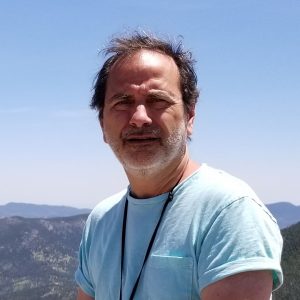 Jonathan David was raised in New York City and currently lives in Chapel Hill, NC. Jonathan’s first solo CD, The Persistence of Song, featuring solo vocal works with piano, was released on Centaur Records in January 2020. His Blue Planet Blues, a 3-movement extended work for 8-part chorus, was featured in an ecology-focused exhibition in Skopje, Northern Macedonia, in August-September, 2019. Other highlights of the 2019-20 season include the premiere of Triptych: Reflections on Race to Texts of Zsuzsanna Ardó, by C4, the Choral Composer/Conductor Collective, in June 2020; and the premiere of Prayer of Saint Francis by the Meredith College Community Chorus (Raleigh, NC), in May 2020. Jonathan has had music commissioned by the New York Treble Singers, Duke University, Atlanta Young Singers, Marble Collegiate Church, the Manhattan Wind Ensemble, and saxophonist David Wozniak, among others. His choral music has been performed throughout the US and Europe at such venues as Duke Chapel, the European Parliament in Brussels, the Palace of Westminster, and the Cathedral of Notre Dame-Paris. Jonathan has served as Composer-in-Residence for The Greenwich Village Singers and was a founding member of the pioneering new music chorus, C4. His Stabat Mater is featured on C4’s debut CD. He has served on the judging panel for the ASCAP/Deems Taylor Awards. From 2005-2011 he was the Classical Editor for the internet music service, Napster. Jonathan’s music is published by Oxford University Press, See-A-Dot Music, and Paraclete Press, and is also available through his website, www.jonathandavidmusic.com. Contact: jonmdavid@gmail.com
Jonathan David was raised in New York City and currently lives in Chapel Hill, NC. Jonathan’s first solo CD, The Persistence of Song, featuring solo vocal works with piano, was released on Centaur Records in January 2020. His Blue Planet Blues, a 3-movement extended work for 8-part chorus, was featured in an ecology-focused exhibition in Skopje, Northern Macedonia, in August-September, 2019. Other highlights of the 2019-20 season include the premiere of Triptych: Reflections on Race to Texts of Zsuzsanna Ardó, by C4, the Choral Composer/Conductor Collective, in June 2020; and the premiere of Prayer of Saint Francis by the Meredith College Community Chorus (Raleigh, NC), in May 2020. Jonathan has had music commissioned by the New York Treble Singers, Duke University, Atlanta Young Singers, Marble Collegiate Church, the Manhattan Wind Ensemble, and saxophonist David Wozniak, among others. His choral music has been performed throughout the US and Europe at such venues as Duke Chapel, the European Parliament in Brussels, the Palace of Westminster, and the Cathedral of Notre Dame-Paris. Jonathan has served as Composer-in-Residence for The Greenwich Village Singers and was a founding member of the pioneering new music chorus, C4. His Stabat Mater is featured on C4’s debut CD. He has served on the judging panel for the ASCAP/Deems Taylor Awards. From 2005-2011 he was the Classical Editor for the internet music service, Napster. Jonathan’s music is published by Oxford University Press, See-A-Dot Music, and Paraclete Press, and is also available through his website, www.jonathandavidmusic.com. Contact: jonmdavid@gmail.com
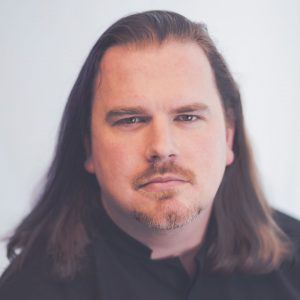 David Walters currently serves as the Assistant Conductor of the ISing Choir which has raised over $350,000 in support of local non-profit organizations such as the Beaverton Arts Foundation, Sisters of the Road and Homeplate. In addition, he is the Music Director at First Presbyterian Church in McMinnville, OR. He holds both an MM in choral conducting and a BM in Music Composition from PSU and is a founding member of the Nexus Vocal Ensemble. His most recent premiere was The Winged Victory, performed in December 2019 by the ISing Choir under the direction of the composer, and Wild, Unspoken, performed in November 2019 by the Portland State Chamber Choir under the direction of Dr. Ethan Sperry. As a vocalist, he has toured Italy, Hungary, the Czech Republic, China, Japan, Chile and Argentina, having most recently appeared as the bass soloist in Mozart’s Requiem, Mozart’s Coronation Mass, and as the baritone soloist in Orff’s Carmina Burana. Contact: David@DwaltersMusic.com; website: www.dwaltersmusic.com
David Walters currently serves as the Assistant Conductor of the ISing Choir which has raised over $350,000 in support of local non-profit organizations such as the Beaverton Arts Foundation, Sisters of the Road and Homeplate. In addition, he is the Music Director at First Presbyterian Church in McMinnville, OR. He holds both an MM in choral conducting and a BM in Music Composition from PSU and is a founding member of the Nexus Vocal Ensemble. His most recent premiere was The Winged Victory, performed in December 2019 by the ISing Choir under the direction of the composer, and Wild, Unspoken, performed in November 2019 by the Portland State Chamber Choir under the direction of Dr. Ethan Sperry. As a vocalist, he has toured Italy, Hungary, the Czech Republic, China, Japan, Chile and Argentina, having most recently appeared as the bass soloist in Mozart’s Requiem, Mozart’s Coronation Mass, and as the baritone soloist in Orff’s Carmina Burana. Contact: David@DwaltersMusic.com; website: www.dwaltersmusic.com
Edited by Irene Auerbach, UK/Germany
Scores
Jubilate Deo by Simone Campanini

